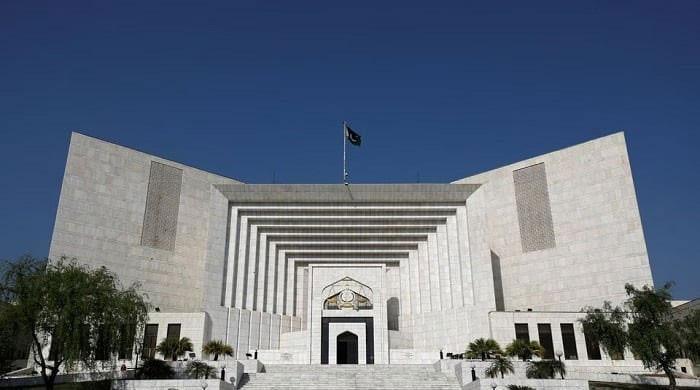- The constitutional bench of the Supreme Court publishes an order of 55 pages.
- SCE rejects the pleas of the JUDGS of the IHC against the presidential authority.
- The constitutional bench issued a short order on June 19.
The constitutional bench of the Supreme Court published its detailed verdict on Thursday in a case relating to the seniority and the transfer of the judges of the High Court of Islamabad (CIHC), judging that the powers of the president to transfer the judges of the High Court are independent but subject to certain conditions.
The widest constitutional bench of the Supreme Court was led by judge Muhammad Ali Mazhar and included the judges Naeem Akhtar Afghan, judge Shahid Bilal Hassan, judge Salahuddin Panhwar and judge Shakeel Ahmad.
“It is clearly articulated under article 200 of the Constitution that the powers of the president for the transfer of a judge from the high court of a high court to another high court are an independent article in its application, but with certain security measures and guarantees and these powers depend on any other article in the Constitution,” said judgment 3-2.
In February of this year, five IHC judges had moved the Supreme Court under article 184, paragraph 3, of the Constitution against the appointment of judge Sarfraz Dogar as chief judge of the IHC, as well as judges of the High Court.
The plea was filed by judge Mohin Akhtar Kiyani, judge Tariq Mehmood Jahangiri, judge Babar Sattar, judge Sardar Ejaz Ishaq Khan and judge Saman Riffat Imtiaz.
The judges of the IHC had urged the Supreme Court to declare that the president does not have the discretionary power without hindrance and unbridled to transfer the judges from one high court to another, under article 200 (1) of the Constitution, without manifest public interest, and in a way which hinders the principles of independence of the magistracy and the separation of powers.
Their petition also requested the Supreme Court to declare that, in accordance with the established law pronounced by the highest jurisdiction in the Aslam Awan and Farrukh Irfan case, the inter-site seniority of respondents No. 9-11 will be determined from the date on which they take the oath as the judges of the IHC and would therefore be inferior to the list of the elder.
The high -level court had resumed the case on April 17. In his 3-2 Verdict by majority on June 19, the Supreme Court eliminated the multiple petitions with judge Mazhar, judge Hassan and judge Panhwar to put aside the Pleidoyers.
The Afghan judge and judge Ahmad, however, granted the petitions and canceled the notification of the transfer of the judges.
In his detailed 55 -page verdict published today, the Constitutional bench said that the president can transfer the judges of the high courts, but no judge will be transferred except with their consent and after the president’s consultation with the chief judge of Pakistan and the main judges of the two high lessons.
The exercise of transfer powers by the president under article 200 of the Constitution is not unregulated or without hindrance, read the verdict.
By rejecting the petition, the Constitutional bench said that the President’s powers for the transfer of the judges of the High Court and the provisions contained under article 175a of the Constitution for the appointment of judges to the Supreme Court, to the High Courts, and to the Federal Sharia Court by the Judicial Commission of Pakistan, are two distinct provisions dealing with situations and judicial.
The transfer of a judge by the president under article 200 cannot be interpreted as a new appointment, read the judgment.




